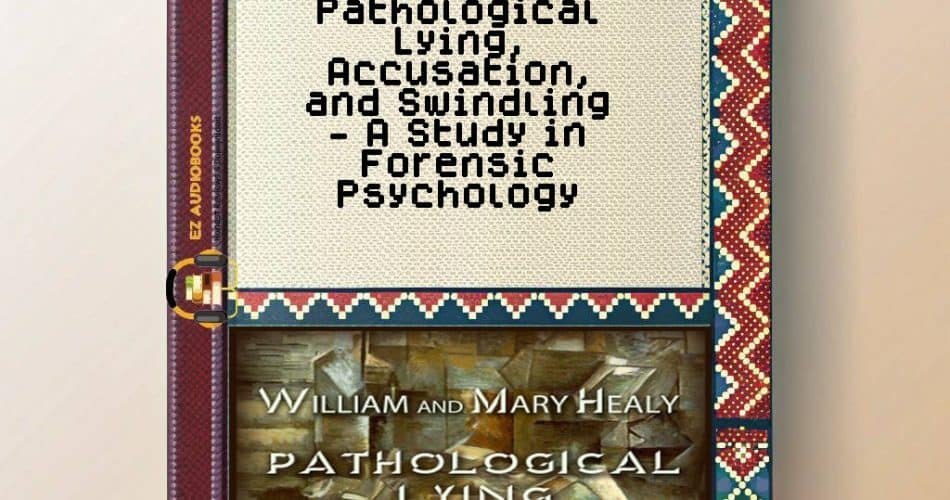Audiobook Sample
Listen to the sample to experience the story.
Please wait while we verify your browser...
- Title: Pathological Lying, Accusation, and Swindling – A Study in Forensic Psychology
- Author: William Healy
- Narrator: Mary Schneider
- Length: 09:31:47
- Version: Abridged
- Release Date: 01/01/2016
- Publisher: LibriVox
- Genre: Non-Fiction, Psychology
- ISBN13: SABLIB9783452
When I first stumbled upon “Pathological Lying, Accusation, and Swindling – A Study in Forensic Psychology” by William Healy, narrated by Mary Schneider, I was immediately drawn to its promise of unraveling the complexities of human behavior through a forensic lens. Available as a free audiobook from LibriVox, this work offers a fascinating glimpse into early 20th-century psychological thought – a time capsule of sorts, brimming with both insight and the inevitable biases of its era. As a literature professor with a passion for cross-cultural narratives and the evolution of storytelling, I found this audiobook experience to be a compelling blend of historical curiosity and intellectual challenge.
What fascinates me most is how this book bridges my own experiences with the study of narrative and human perception. Years ago, during my time as a visiting professor in Tokyo, I immersed myself in Haruki Murakami’s “Kafka on the Shore”. Reading it in both Japanese and English revealed how language shapes our understanding of a story’s deeper truths. Similarly, listening to Healy’s work narrated by Mary Schneider brought to mind that same interplay of medium and meaning. The audiobook format, with its intimate delivery, amplifies the case studies of pathological liars, accusers, and swindlers, making their stories feel less like distant artifacts and more like whispered confessions in a quiet room. This reminds me of when I led a seminar at Berkeley on “Cloud Atlas”, where we debated how the shift from text to audio reshapes a narrative’s emotional resonance. Here, too, the listening experience transforms Healy’s clinical analysis into something hauntingly personal.
Through a cultural lens, the book’s content is a study in contrasts. Healy – presumably the pioneering child psychiatrist William Healy – presents detailed case studies of individuals whose behaviors defy societal norms: the compulsive liar, the relentless accuser, the cunning swindler. These stories, rooted in psychoanalytic frameworks like repression and the unconscious, reflect the early 20th-century fascination with the hidden drivers of the mind. Yet, as a modern listener, I couldn’t help but wince at the dated interpretations of mental illness, sexuality, gender, and race. The text is mired in what we now recognize as flawed thinking – views that pathologize difference rather than contextualize it. For instance, the analysis often frames these behaviors as moral failings rather than products of environment or trauma, a perspective that feels jarring against today’s more nuanced psychological discourse.
Mary Schneider’s narration, however, elevates the audiobook experience. Her voice is steady and measured, lending a clinical gravitas that suits the subject matter. At just under 10 hours (0.397071759259259 days, per the metadata – a quirky metric!), the audiobook maintains a brisk pace, with Schneider’s clear enunciation ensuring that even the densest passages remain accessible. Her tone strikes a balance between detachment and empathy, mirroring the forensic psychologist’s dual role as observer and interpreter. The audio quality, typical of LibriVox’s volunteer-driven efforts, is functional rather than polished – occasional background noise creeps in, but it’s a minor distraction for a free audiobook. Still, I found myself wishing for a touch more dynamism in her delivery to match the emotional weight of the case studies.
The strength of this work lies in its historical value. It’s a window into the evolution of forensic psychology, showcasing how far we’ve come in understanding the interplay of mind and behavior. The case studies are gripping – think of them as psychological detective stories, each unraveling a puzzle of deception or delusion. Yet, the limitations are equally stark. The book’s reliance on outdated theories and its failure to question societal biases make it a relic as much as a resource. Modern listeners versed in psychology might find it more useful as a critique of past methodologies than as a practical guide.
How does it compare to similar works? I’m reminded of Sigmund Freud’s case studies, which also blend narrative flair with psychoanalytic theory, though Freud’s scope is broader and his style more literary. Healy’s focus on forensic applications feels narrower but more grounded in real-world implications – less speculative, more procedural. A contemporary counterpart might be something like Bessel van der Kolk’s “The Body Keeps the Score”, which updates trauma theory with scientific rigor absent in Healy’s time. The contrast highlights how this audiobook serves as a stepping stone in the field’s development.
For potential listeners, I’d recommend this free audiobook to those intrigued by psychology’s history or the roots of criminology. It’s ideal for students of forensic psychology, literature enthusiasts like myself who enjoy dissecting narrative intent, or anyone curious about how past societies grappled with deviant behavior. However, approach it with a critical eye – its insights are best appreciated when paired with an awareness of its shortcomings.
Reflecting on this listening experience, I’m struck by how it mirrors my own intellectual journey. Just as I once puzzled over Murakami’s layered realities or debated “Cloud Atlas”’s structural shifts, I found myself sifting through Healy’s text for meaning beneath the surface. It’s a reminder of why I’m drawn to stories – whether in print, digital, or audio form: they challenge us to see the world through others’ eyes, even when those eyes are clouded by the limits of their time.
With curiosity and a nod to the past’s lessons,
Prof. Emily Chen

